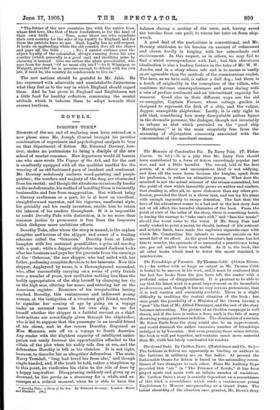The Memoirs of Constantine Dix. By Barry Pain. (T. Fisher
Unwin. 3s. 6d.)—It is a pity that Mr. Barry Pain should have contributed to a form of fiction exceedingly popular just now, and not a little harmful. Tho record, told in the first person, of a clever and unscrupulous thief is not edifying, and does all the more harm because the burglar, apart from his profession, is rather an' attractive person. What does the mischief is not the actual account of the crimes committed, but the point of view which insensibly grows on author and readers, that stealing is, after all, no more dishonest than any other pro- fession, provided the thief is a clever man, and can lay his plans with enough ingenuity to escape detection. The fact that the hero of the adventures comes to a bad end in the last story does not at all affect the harmful character of the book. From the point of view of the teller of the story, there is something heroic in having the courage to "take one's risk," and "face the music" should the worst come to the worst. If Mr. Barry Pain had really wished to point a moral, he should, instead of his reticent and artistic finish, have made the explosive cigarette-case with which Mr. Constantine Dix intends to commit suicide on his arrest fail of its effect. As the great burglar's last crime has led him to murder, the spectacle of so successful a practitioner being sus. per col, might have been useful. As it is, the book, like all other books which tend to lower the moral standard, is mischievous.






































 Previous page
Previous page